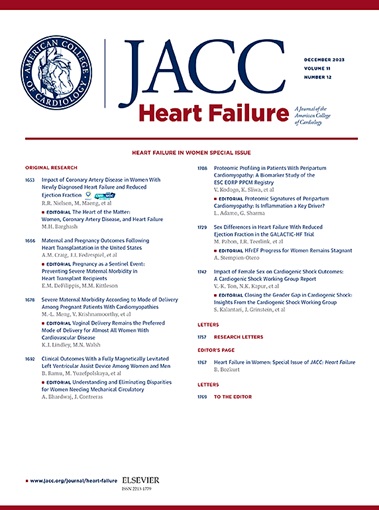Efficacy and Safety of Finerenone in Heart Failure With Preserved Ejection Fraction
IF 10.3
1区 医学
Q1 CARDIAC & CARDIOVASCULAR SYSTEMS
引用次数: 0
Abstract
Background
Pooling data from participants with heart failure with mildly reduced ejection fraction (HFmrEF) or heart failure with preserved ejection fraction (HFpEF) from all completed outcomes trials evaluating finerenone to date may enhance understanding of its safety and efficacy in this high-risk and heterogeneous population.
Objectives
In this prespecified participant-level pooled analysis of the FIDELIO-DKD, FIGARO-DKD, and FINEARTS-HF trials (FINE-HEART), we evaluated the safety and efficacy of finerenone in individuals with HFmrEF/HFpEF.
Methods
The treatment effects of finerenone vs placebo on cardiovascular death or heart failure hospitalization were evaluated using Cox proportional hazards regression models stratified by trial. Additional endpoints included cardiovascular death, HF hospitalization, new-onset atrial fibrillation, and all-cause death.
Results
Among 18,991 pooled trial participants, 7,008 (36.9%) had HFmrEF/HFpEF (mean age, 71 ± 10 years; 44% female). Over a median follow-up of 2.5 years, finerenone reduced cardiovascular death or heart failure hospitalization compared with placebo (HR: 0.87 [95% CI: 0.78-0.96]; P = 0.008). Consistent effects were observed across trials (Pinteraction = 0.24), key subgroups, and baseline estimated glomerular filtration rate (Pinteraction = 0.47), urine albumin-to-creatinine ratio (Pinteraction = 0.62), and glycated hemoglobin (Pinteraction = 0.93). Finerenone additionally appeared to reduce heart failure hospitalization (HR: 0.84 [95% CI: 0.74-0.94]; P = 0.003) and new-onset atrial fibrillation (HR: 0.75 [95% CI: 0.58-0.97]; P = 0.030), but did not statistically significantly decrease cardiovascular death or all-cause death. Hyperkalemia was more common, and hypokalemia was less common, with finerenone vs placebo. Serious adverse events were similar between the treatment arms.
Conclusions
This participant-level pooled analysis of 3 large-scale outcomes trials supports the use of finerenone in individuals with HFmrEF/HFpEF across a broad range of cardiovascular-kidney-metabolic risk. (PROSPERO registration: CRD42024570467)
芬尼酮治疗保留射血分数心力衰竭的疗效和安全性
背景:从迄今为止评估芬尼酮的所有已完成的结局试验中收集的具有轻度射血分数降低(HFmrEF)或具有保留射血分数(HFpEF)的心力衰竭参与者的数据,可以增强对其在这种高风险和异质性人群中的安全性和有效性的理解。在这项预先指定的参与者水平的FIDELIO-DKD、FIGARO-DKD和finears - hf试验(FINE-HEART)的汇总分析中,我们评估了finerenone在HFmrEF/HFpEF患者中的安全性和有效性。方法采用试验分层的Cox比例风险回归模型评价芬尼酮与安慰剂对心血管死亡或心力衰竭住院的治疗效果。其他终点包括心血管死亡、心衰住院、新发房颤和全因死亡。结果在18,991名合并试验参与者中,7,008名(36.9%)患有HFmrEF/HFpEF(平均年龄71±10岁;44%的女性)。在中位随访2.5年期间,与安慰剂相比,芬烯酮降低了心血管死亡或心力衰竭住院率(HR: 0.87 [95% CI: 0.78-0.96];P = 0.008)。在所有试验(p相互作用= 0.24)、关键亚组和基线肾小球滤过率(p相互作用= 0.47)、尿白蛋白与肌酐比(p相互作用= 0.62)和糖化血红蛋白(p相互作用= 0.93)中观察到一致的效果。芬那酮还能减少心力衰竭住院率(HR: 0.84 [95% CI: 0.74-0.94];P = 0.003)和新发心房颤动(HR: 0.75 [95% CI: 0.58-0.97];P = 0.030),但没有统计学意义上显著降低心血管死亡或全因死亡。细芬烯酮组与安慰剂组相比,高钾血症更常见,低钾血症更不常见。严重不良事件在治疗组之间相似。结论:这项对3项大型结局试验的参与者水平的汇总分析支持在广泛的心血管-肾脏-代谢风险的HFmrEF/HFpEF患者中使用芬尼酮。(普洛斯佩罗注册号:CRD42024570467)
本文章由计算机程序翻译,如有差异,请以英文原文为准。
求助全文
约1分钟内获得全文
求助全文
来源期刊

JACC. Heart failure
CARDIAC & CARDIOVASCULAR SYSTEMS-
CiteScore
21.20
自引率
2.30%
发文量
164
期刊介绍:
JACC: Heart Failure publishes crucial findings on the pathophysiology, diagnosis, treatment, and care of heart failure patients. The goal is to enhance understanding through timely scientific communication on disease, clinical trials, outcomes, and therapeutic advances. The Journal fosters interdisciplinary connections with neuroscience, pulmonary medicine, nephrology, electrophysiology, and surgery related to heart failure. It also covers articles on pharmacogenetics, biomarkers, and metabolomics.
 求助内容:
求助内容: 应助结果提醒方式:
应助结果提醒方式:


